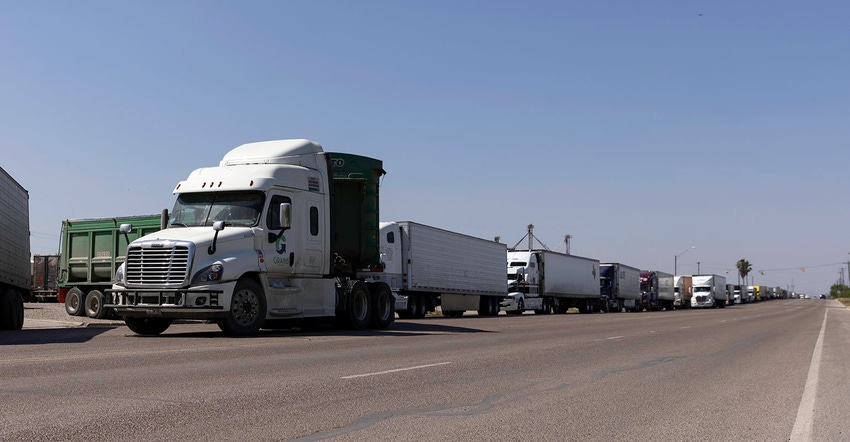Mexican border backlogs impacting ag trade
State of Texas actions have resulted in backlog of fresh produce with delays as long as 30+ hours.

Texas Governor Greg Abbott announced on April 6 aggressive actions by the State of Texas to secure the border in the wake of President Biden's decision to end Title 42 expulsions. However, those tighter border controls have resulted in delays of shipments at the border, including perishable food goods.
According to a statement from White House Press Secretary Jen Psaki, local businesses and trade associations are calling on Abbott to reverse this decision because trucks are facing lengthy delays exceeding 5 hours at some border crossings and commercial traffic has dropped by as much as 60%.
Abbott lifted his original order for bridges in El Paso and other cities after reaching a new security agreement with the neighboring Mexican states of Chihuahua and Coahulia. Inspection orders remain in other parts along Texas' 1,200-mile border, including the busy Rio Grande Valley, but Mexican trade leaders were optimistic those would also end soon.
The Associated Press reported that “Texas Agriculture Commissioner Sid Miller, a Republican, called the inspections a ‘catastrophic policy’ that is forcing some trucks to reroute hundreds of miles to Arizona.”
The International Fresh Produce Association is encouraged by the recent announcements that some of the border crossings in Texas have been reopened.
While this action is positive, IFPA is urging that normal border access between the United States and Mexico resume as soon as possible. These actions have severely disrupted the movement of fresh fruits and vegetables along Texas’ ports of entry at the U.S.-Mexico border, resulting in increased inspection delays and loss of product.
“The action by the State of Texas has resulted in a huge backlog of fresh produce. In some cases there are reported delays of 30+ hours at the border, with the state inspections interfering with the responsibilities of U.S. Customs and Border Protection, which is already tasked with border inspections and security,” explains IFPA Chief Policy Officer Robert Guenther. “In turn, produce that was destined to United States consumers, in some cases, will have to be destroyed because of the perishability of our products. This will result in millions of lost economic production not only in Mexico but to the state of Texas and potentially other border states that are now experiencing similar delays. We urge the Governor to convene all stakeholders impacted by this decision and resolve this issue as soon as possible.”
Gary Joiner, spokesperson for the Texas Farm Bureau Federation, says the Texas Farm Bureau appreciates the leadership and efforts of Governor Abbott to address the border crisis and its impact of farmers, ranchers and communities in the border region. “It is imperative that the federal government takes action right away and assumes its responsibility to secure the southern border,” he explains.
“The border situation is untenable,” Joiner adds. “At the same time, commerce must continue to flow through ports of entry. The movement of agricultural goods and other products is vitally important to the Texas agriculture industry and important supply chains.”
Joiner says, “We are encouraged by the recent agreement in the Laredo region that is facilitating movement and inspections at the port of entry. We hope other similar measures and agreements can be achieved at other points of entry.”
About the Author(s)
You May Also Like





